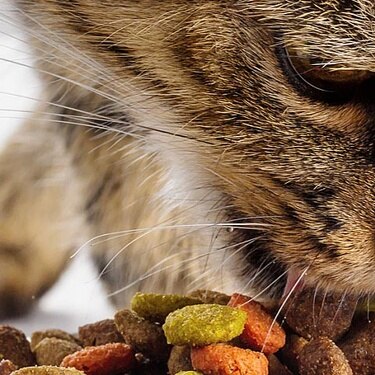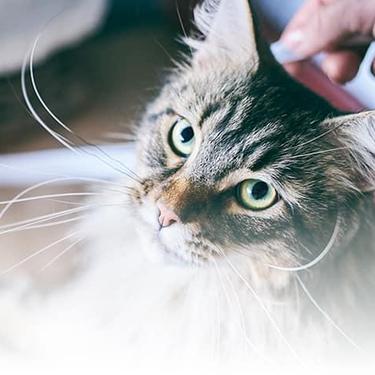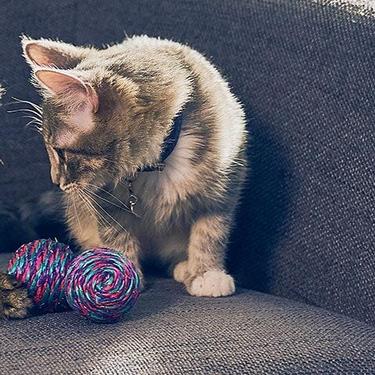
-
Find the right food for your petTake this quiz to see which food may be the best for your furry friend.Find the right food for your petTake this quiz to see which food may be the best for your furry friend.Featured products
 Adult Wet Dog Food with Beef
Adult Wet Dog Food with BeefHill's Science Plan Adult Multipack Wet Dog Food with Chicken, Beef & Turkey are complete premium pet foods for adult dogs from 1 year. Your dog will love these deliciously smooth and savoury minced loaves, formulated for balanced nutrition and overall health.
Shop Now Puppy Food
Puppy FoodHill's Science Plan Puppy Multipack Wet Dog Food with Chicken & Beef are complete premium pet foods for growing puppies from weaning until 1 year old and for pregnant and nursing dogs. Your puppy will love these deliciously smooth and savoury minced loaves, formulated for balanced nutrition and overall health.
Shop Now Mature Adult Dog Food
Mature Adult Dog FoodHill's Science Plan Mature Adult Multipack Wet Dog Food with Chicken & Beef are complete premium pet foods for mature adult dogs from 7 years. Your dog will love these deliciously smooth and savoury minced loaves, formulated to deliver the appropriate amount of energy to support the needs of adult dogs.
Shop NowFeatured products Adult Multipack Wet Cat Food with Beef, Ocean Fish & Chicken
Adult Multipack Wet Cat Food with Beef, Ocean Fish & ChickenTender chunks in gravy for cats, with high-quality protein to maintain lean muscle. With vitamin E and omega-3s & -6s for healthy skin and balanced minerals to support healthy vital organs.
Shop Now Mature Adult Wet Cat Food with Chicken
Mature Adult Wet Cat Food with Chicken
Tender chicken chunks in gravy for mature adult cats. Made with easy-to-digest ingredients, high-quality protein for lean muscle maintenance and antioxidant vitamins C+E for optimal health.
Shop Now Light Adult Multipack Wet Cat Food with Chicken & Ocean Fish
Light Adult Multipack Wet Cat Food with Chicken & Ocean FishTender chicken chunks in gravy for cats, with L-carnitine and fewer calories for ideal weight management. Packed with high-quality protein, omega-6s, and vitamin E for shiny fur and healthy skin.
Shop Now -
Dog
- Dog Tips & Articles
-
Health Category
- Weight
- Food & Environmental Sensitivities
- Urinary
- Digestive
- Joint
- Kidney
-
Life Stage
- Puppy Nutrition
- Adult Nutrition
- Senior Nutrition
Cat- Cat Tips & Articles
-
Health Category
- Weight
- Skin & Food Sensitivities
- Urinary
- Digestive
- Kidney
-
Life Stage
- Kitten Nutrition
- Adult Nutrition
Featured articles Show some love with wet foods: a great choice for pets with health issues
Show some love with wet foods: a great choice for pets with health issuesShow some love with wet foods: a great choice for pets with health issues.
Read More The Right Diet For Your Pet
The Right Diet For Your PetIn people, the right diet is very important. If you are eating the wrong way for your metabolism, activity level, age and lifestyle you could end up with health issues.
Read More The Incredible Science Behind Your Pet's Microbiome
The Incredible Science Behind Your Pet's MicrobiomeLearn what your pet's microbiome is, how it contributes to your pet's gut and overall health, and why nutrition is important in maintaining healthy microbiomes.
Read More -


To train your new kitten, you need an understanding of how they think and behave.
That said, with a bit of understanding and patience, there's no reason why you can't train your kitten. And it's important that you do. After all, how will you groom your kitten or keep a close eye on their health if you don't train your kitten to be handled?
The basic principles
The first thing to realise is that cats do not understand punishment, encouraging good behaviour is much more effective. Sound tricky? Just remember the three 'R's' - respect, reinforcement and rewards.
Let's take respect. It's important that you behave in a 'cat friendly' manner. Did you know, for example, that cats dislike being stared at, or that they can't abide sudden noises or movements?
Reinforcement just means consistency and repetition. If your kitten does something you wish to discourage (like jumping on the kitchen counters), always gently and firmly say no. When they are doing something you want to encourage, be sure to always make a big fuss.
Which brings us neatly onto rewards. There are two types of rewards - praise from you and a tasty treat. Both are very motivating to your kitten.


Tasty Tips
Training your kitten to be handled
Most cats don't like being picked up, and the earlier you get your kitten used to it the better.
A lot of people unwittingly teach their kitten bad habits. They pick their kitten up, kitten struggles and they immediately put them down again. Thus, the kitten learns that by struggling they get their own way.
A better approach is to pick your kitten up and then, if they struggle, continue to hold gently but firmly. Once settled lavish lots of praise and set them down.
Scratching
Can you train your kitten not to scratch? No. Kittens love to scratch - it's a natural form of territorial marking that also gives the muscles a good stretch. Does this mean you have to accept ruined furniture? No. You just have to train your kitten to redirect the scratching.
Buy your kitten a scratching post (rough surfaces are particularly appealing so you might want to choose one covered with something like rope). Play with your kitten near the scratching post and then, when your kitten uses it, reward with praise and maybe a treat.
By scratching an item of furniture your kitten is marking it with their scent. Cleaning it with an anti-odour product may discourage them from going back there. Some people find putting something like polythene on the item of furniture helpful as kittens generally aren't so keen to scratch slippery surfaces.
Discouraging biting
Play biting is natural kitten behaviour. If your kitten bites your hand during play, end the session immediately. Whatever you do, don't jerk your hand away. This just makes the game even more fun! Toys and balls are safer objects of prey.
Clicker training
Clicker training is a modern, kind and scientific way of training animals. You use all the same principles already discussed but your kitten also gets a 'click' to mark any good behaviour. More information on clicker training.


One of our staff authors prepared this article for you
Related products


Tender chunks in gravy for cats, with high-quality protein to maintain lean muscle. With vitamin E and omega-3s & -6s for healthy skin and balanced minerals to support healthy vital organs.

Tender chicken chunks in gravy for mature adult cats. Made with easy-to-digest ingredients, high-quality protein for lean muscle maintenance and antioxidant vitamins C+E for optimal health.

Tender chicken chunks in gravy for cats, with L-carnitine and fewer calories for ideal weight management. Packed with high-quality protein, omega-6s, and vitamin E for shiny fur and healthy skin.
Related articles

From essential vitamins & minerals to different types of meat, learn what to look for when choosing the best cat food for your feline.

There are three common ways to feed a cat. Each way has its advantages and disadvantages.

Learn how to make homemade cat treats that are healthy for your pet with this recipe from Hills Pet Nutrition.

Kittens grow a lot in their first year, so it is important to provide them with the proper nutrients early, so they grow up healthy and strong. Learn more.

Put your cat on a diet without them knowing
Our low calorie formula helps you control your cat's weight. It's packed with high-quality protein for building lean muscles, and made with purposeful ingredients for a flavourful, nutritious meal. Clinically proven antioxidants, Vitamin C+E, help promote a healthy immune system.
Put your cat on a diet without them knowing
Our low calorie formula helps you control your cat's weight. It's packed with high-quality protein for building lean muscles, and made with purposeful ingredients for a flavourful, nutritious meal. Clinically proven antioxidants, Vitamin C+E, help promote a healthy immune system.

